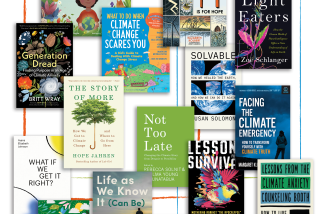ENVIRONMENT
- Share via
STATE OF THE WORLD: A Worldwatch Institute Report on Progress Toward a Sustainable Society by Lester Brown et al. (Norton: $19.95 ; 268 pp.) Now in its 10th annual edition, this has become the environmentalist’s Book of Books. Each edition takes on the main issues of the year, updating information on trends and crises from previous volumes. The book is translated into 27 languages, and was used, by 1989, in more than 1,000 courses in 584 colleges and universities. This year’s issues range from Water Scarcity to “Rediscovering Rail,” to “Closing the Gender Gap in Development.”
Somewhere in the late 1980s the burden fell on environmentalists to be cheerful and hopeful and constructive about the way we are killing the earth, and the Worldwatch authors bear this burden gracefully. Still, we undo this knot so slowly it’s hard to delight in the fact that “California generates enough electricity from wind power and solar thermal plants to meet the needs of nearly 2 million of its residents,” when we have deforested, over the last decade, an area the size “of Malaysia, the Philippines, Ghana, the Congo, Ecuador, El Salvador and Nicaragua.” It’s a book of facts, and the facts are appalling.
The main emphasis in this year of Rio seems to be “building an environmentally stable global economy,” and the best way to do that says Lester Brown in his first chapter is through tax policy: “the partial replacement of income taxes with environmental taxes,” which “permits the market to work unimpeded.” Activities to be taxed would include “the burning of fossil fuels, production of hazardous chemical waste, the generation of nuclear waste, pesticide use, and the use of virgin raw materials.” The question remains: Wouldn’t some of these thugs still rather pay the tax and reap the ever-increasing profits as resources dwindle? But this is not a constructive question. There is no moral imperative, and that, alas, seems to have become a fact in 1993, the most hopeful year in a very long time for untying the knot.
More to Read
Sign up for Essential California
The most important California stories and recommendations in your inbox every morning.
You may occasionally receive promotional content from the Los Angeles Times.










